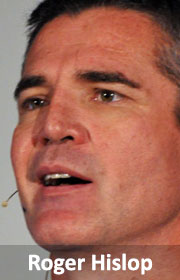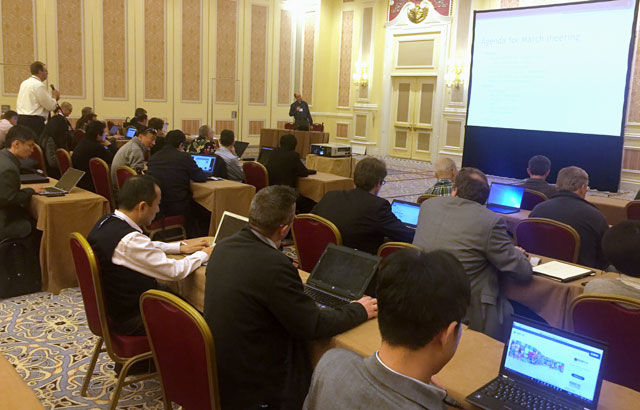 Global standards bodies are the crucible in which our networking future is forged. It is the well from which our connectivity springs. It may look like a crowd of middle-aged bearded and bespectacled men warming the seats of hotel conference rooms, but it’s so much more. It’s where decisions are made, arguments had, and documents prepared that will decide how millions of products that we use every day will work. And Africa is not there.
Global standards bodies are the crucible in which our networking future is forged. It is the well from which our connectivity springs. It may look like a crowd of middle-aged bearded and bespectacled men warming the seats of hotel conference rooms, but it’s so much more. It’s where decisions are made, arguments had, and documents prepared that will decide how millions of products that we use every day will work. And Africa is not there.
Last week, the IEEE 802 group had its plenary conference in Macau, a special autonomous region of China, just over the Zhujiang River Estuary from Hong Kong. In the gaudy halls of the leviathan Venetian Hotel and Casino, research and development engineers from America, Europe and Asia came together to hammer out their differences to make technical standards stronger, better, more.
The IEEE, or the Institute of Electrical and Electronic Engineers, was an American organisation, but became global. It has a number of societies, including the Computer Society. And it’s in the computer society where IEEE 802 sits, making standards for local- and wide-area networking.
These include 802.11 (wireless networks, you know it as Wi-Fi), 802.3 (wired LAN such as Ethernet), 802.15 (“personal area” networks, which includes Bluetooth, but also the new visible-light network “Li-Fi”), 802.22 for TV white space networks, and others.
Representatives on the different working groups are researchers from equipment manufacturers, consultants, network operators, as well as universities and government agencies. There are more MScs and PhDs than you can shake a stick at. They all volunteer their time and effort — for the commercial success of their organisations, and for the greater good.
They are meticulous — documenting every step in the process, considering every angle. Millions, even billions of dollars hang off things being done right. There’s something like 10 billion Wi-Fi devices out there. Three hundred million Gigabit Ethernet ports shipped — just last year.
Important work
There was no one from Africa at the plenary. Okay, sure, there was a smattering of African descent (like two or three out of almost a thousand people). But actually flown in from our continent? Nada (apart from me). How many Africans have chaired IEEE 802 working groups? Zilch.
Don’t feel too bad, though … the same applies to South America. There is also a hopeless paucity of involvement from that other southern land.
Why? No good reason. There are technologists and researchers on both continents doing world-class work. There are many people from Africa that have either the technical skills, or the organisational skills, or both.
Cost is a factor, but a minor one. IEEE membership is US$160/year. Attending conferences is expensive, but every day thousands of people from South Africa get on planes to far off places for business.
What’s stopping us is awareness, and confidence — knowing that you can get involved, and be directly engaged with some of the world’s most cutting-edge technology development, that we’d be very welcome to join in. All of the IEEE leaders I talked to recognised the need to bring Africa into the conversation. They want it to happen.
And by cutting edge, we’re looking at new Ethernet standards for bonded 25Gbit/s interfaces to handle 400Gbit/s speeds. We’re looking at wireless technology that uses the office lights to carry hundreds of megabits per second and mobile technology that will take IEEE technologies to the edge of 5G mobile (the IEEE is way ahead of the mobile industry on 5G).

I recently got involved in the 802.22 working group, because cognitive radio is where fame, fortune and glamour begins. Because the IEEE wants to introduce new blood and fresh ideas, I was elected chair of the 802.22.3 task group on SCOS (spectrum characterisation and occupancy sensing). So now we have one African chairing a group.
White-space spectrum and dynamic spectrum assignment is a very exciting area in wireless technology. If you cast your mind back, you may remember 802.22, or “Wi-Far” — a cognitive radio technology designed to provide long distance (20-30km range) communication in the white spaces between TV broadcast channels. The standard was completed in 2012, but things went quiet for a long time, as the regulatory environment had to change radically. Finally, that change is coming.
And it will come faster and faster — we need more spectrum for connectivity. So much of it is unused, or inefficiently used. There are gaps in TV bands. There are bands reserved for satellite links, but not used in most areas. The same is true with bands for nautical and military radar.
What we need to know is what spectrum is being used when, for what, and by whom so that we can share it more efficiently. And that is why the 802.22.3 standard is being developed … spectrum occupancy sensing and real-time spectrum databases are going to be critical to connectivity for ever more people, ever more demanding applications, and ever more devices. There are billions of Internet users, there will be trillions of Internet of things devices.
Important work
South Africa is full of development engineers who are smart, well trained and motivated. We can influence the standards to move in a way that is more suitable for our environment.
We have around 250 wireless Internet service providers in the country shooting Wi-Fi to their customers, point-to-point, over 15km or 20km distances. Why not develop a Wi-Fi substandard that makes the preamble longer by ten microseconds so they can reach 30km?
If there is an accepted IEEE standard, there will be a chipset manufacturer making the silicon, and that will go into product.
Getting involved in this fundamental technology development is easier than you think. And it’s more interesting than you think. The global technology and research, and standards-defining community is more welcoming than you think.
Go to 802world.org and find something interesting. Most working groups have mail reflectors so you can start to follow the conversation.
Africa has been a technology taker for too long. It’s high time we become a technology maker.
- Roger is an engineer in the research and innovation group at Internet Solutions. He writes here in his private capacity

